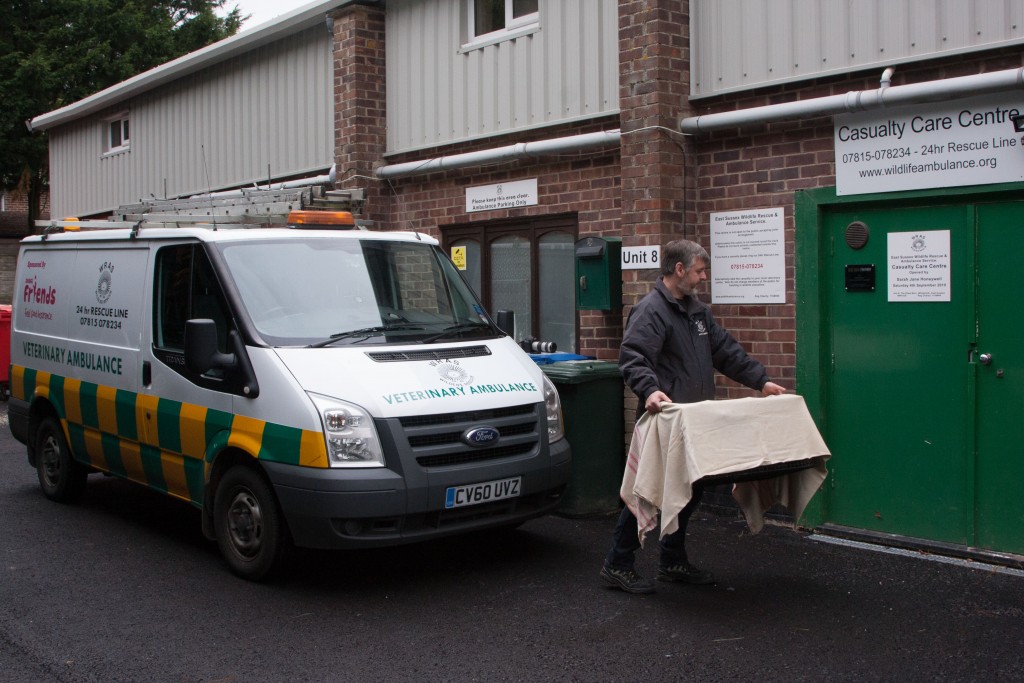
Rescuers were shocked when they arrived at the site of a road casualty Tawny Owl on The Broyle near Ringmer, East Sussex, this morning after a well-meaning motorist repeatedly used his car to run over the injured bird in an attempt to end its suffering.
Volunteer rescuer Trevor Weeks MBE responded to the emergency call from a passing motorist just after 5am this morning and was on site within 20minutes of the initial call.
“When I arrived on site I found another passing motorist had parked up with their hazard lights on, I stopped and the gentlemen present explained that he had seen the owl on the ground unable to fly and wanted to end its suffering so not knowing how else to end the birds suffering he placed the bird on the road and repeatedly ran the bird over, killing it” explained Trevor.
East Sussex Wildlife Rescue deal with hundred of road casualty calls each year and they range from small mammals like hedgehogs to larger animals like swans and badgers too. Many are fatally injured by vehicles but many are concussed and can be treated.
“Although I applaud this gentlemen for stopping rather than just driving on, repeatedly running over a casualty to end its suffering is not a suitable way to end its life and can cause immense suffering. I diplomatically mentioned about calling us or a vet in future and he was surprised that vets would be interested in dealing with wildlife and also concerned about the costs involved. The gentlemen was unable to describe the birds injuries and did not know the birds full condition but seemed to assume that if it had been hit by a car it would need putting down” said Trevor.
WRAS is urging motorists not to attempt to kill any casualty unless they have been trained how to do so but to call their local wildlife rescue or emergency veterinary practice for assistance.
“For road casualty deer you can call Sussex Police on 101 and ask for a Deer Warden to attend. There are four dedicated out of hours emergency veterinary practices which are open at night in East Sussex, Brighton and Hove, plus a few smaller vets practices which provide their own out of hours cover too. Very rarely does a casualty need putting to sleep on the road side. We wouldn’t advise motorists to attempt to pick up foxes, badgers, swans and similar wildlife which can be hazardous but to call a rescue organisation for assistance. We have had a number of occasions when motorists have picked up foxes and badgers which are concussed placed them on the seat of their car only for them to wake up and the drivers has had to pull over and get out of their car quickly and wait for us to arrive and rescue the now lively animal running round inside their vehicle.” Said Trevor.
East Sussex WRAS is only a small local charity but its tries it best to attend and deal with as many calls as possible but at night time they only have one or two volunteers available to help deal with night time casualties. The charity does not have a dedicated night time team and the two main volunteers Trevor and Tony who deal with night time calls are also working during the day so have to jump out of bed to respond to emergencies.
Directory enquiries can search for local rescue organisations and vets practices if you are not sure who to contact in an emergency or as a last resort you can dial the non-emergency police number 101 and ask them for a local rescue contact details especially when a casualty is on the highway and a potential hazard to other motorists.
“Many people seem surprised that vets will deal with wildlife or believe that vets will charge them a huge bill if they call them and take them a casualty, when in reality if a casualty is suffering and needs putting to sleep all good quality veterinary practice will do so free of charge. If the casualty is treatable good vets practices will hold onto the casualty and pass it on to wildlife organisations like WRAS once the casualty is stable” added Trevor.
“I would urge motorists not to move a casualty unless they have to safety reasons either that of the casualty or other motorists to avoid potential additional injuries to the casualty but to either cover with a towel if safe to approach and by doing so you are not going to encourage the animal to move or run out into traffic into more danger. Otherwise keep back and observe from a distance and call for help.” said Trevor.
East Sussex WRAS receives over 3000 calls every year, all its rescuers are volunteers, and the service is funded by donations. The service has expanded since the charity started 20 years ago and increases the number of casualties it can deal with each year. The charities biggest source of funding is donations and standing orders. To find out more about the charity, to make a donation or to find out more advice about dealing with wildlife casualty visit their website at www.wildlifeambulance.org
-END-
Press Contacts:
Trevor Weeks – East Sussex WRAS 01825-873003 or 07931523958.
Photos attached: Trevor delivering a road casualty fox to WRAS Casualty Centre and a Tawny Owl in care.
Share this!